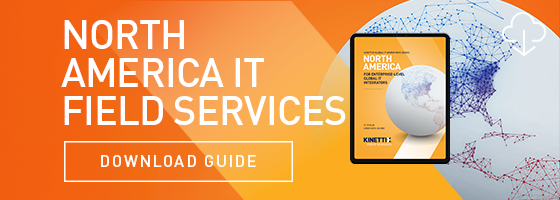When was the last time you wanted to check the status of a project, input information, or send a message on your phone, but couldn’t? Maybe your network was faulty, or maybe you didn’t have your cell phone with you. Either way, you were probably frustrated, even if it was simply a minor inconvenience.
The world is relying more on mobile devices every day, and managed service providers and global IT companies should be leveraging these tools, too. In particular, they should be using a field service management (FSM) platform that allows contractors to collect data and review information while on the go.
Technicians spend most, if not all, of their time out of the office working on jobs and serving customers. Being able to record data and access the information they need for a specific job is not only convenient, but it’s important for a good employee and customer experience. But the importance of mobile goes beyond that, too. Here are six of the benefits of mobile data collection for managed service providers.
Why Should You Invest in Mobile Data Collection?
1. Less Paper
Paperwork can be a headache for all involved. Technicians are worrying about whether or not they remembered everything they needed to take with them for a job. Managers realize they forgot to provide their signature on a key piece of paper. Customers accidentally throw away a copy of an important document.
Using a mobile data collection tool like an FSM platform means that technicians don’t have to carry paperwork with them. They can access all of the information they need for a particular job simply by logging into the platform on their phone or tablet.
2. Near-Instant Updates
Another great benefit to mobile data collection is the speed of the updates. Managers, technicians, and anyone else working on a certain job can see the most up-to-date information in real-time. Technicians can record any issues or successes happening at the job site, and managers can weigh in immediately if necessary. Staying connected means a better experience for everyone.
3. Improved Customer Experiences
“Everyone” includes the customer — having a well-informed team working on a project means the customer is going to have the best possible experience. They know their technicians will be there when they’re supposed to be, and they’ll have any information they need for the job. Some field service management platforms can even track technicians to ensure they’re in the right place at the right time, thus ensuring regulatory compliance and protecting both themselves and the customer.
4. Enhanced Security
Most digital platforms are cloud-based, so you can rest assured that your data will be securely saved and backed up at all times. Should a computer crash, a cell phone be lost, or even a natural disaster occur, there’s no need to worry about losing paperwork or data. It’s all saved remotely to the cloud.
5. Increased Efficiency
Technicians who leverage mobile data collection can complete their jobs more efficiently. They can see past customer information, service history, and applicable warranty information before they even begin a job. This capability will help inform their decisions and actions so they can make the most of their time.
When new jobs come in out of the blue, the platform can also determine which tech is closest to the site and has the time and supplies to take on this new job. This saves valuable company resources, as well as the technicians' time.
6. Ease-of-Use for Technicians
When choosing a platform for mobile data collection, you want to avoid one common mistake. You want to make sure the platform is easy-to-use or intuitive for your techs. Software headaches can be very frustrating, but if you find the right platform, your employees and contractors will love it. They’ll be able to access it on any device they’d like, and they can even access HR information to request time off or log their hours.
Mobile and remote capabilities are becoming even more important right now in the era of social distancing and shelter-in-place orders. However, even when these rules and suggestions are not in place, being able to connect and share data remotely via mobile devices is key to providing a positive work experience.
Using a field service management platform to improve mobile data collection for your global IT company is one of the most important things you can implement for your team and your customers. Make your technicians’ lives easier and improve the customer experience by improving efficiency.
Field service management platforms that offer mobile data collection can transform the way you do business and significantly improve your company’s quality of service. If you’re ready to implement one of these platforms, contact Kinettix. We will work with you to implement, integrate, and enable your FSM platform in your unique environment and in the modern climate, so you can extract the full power of the tool.






